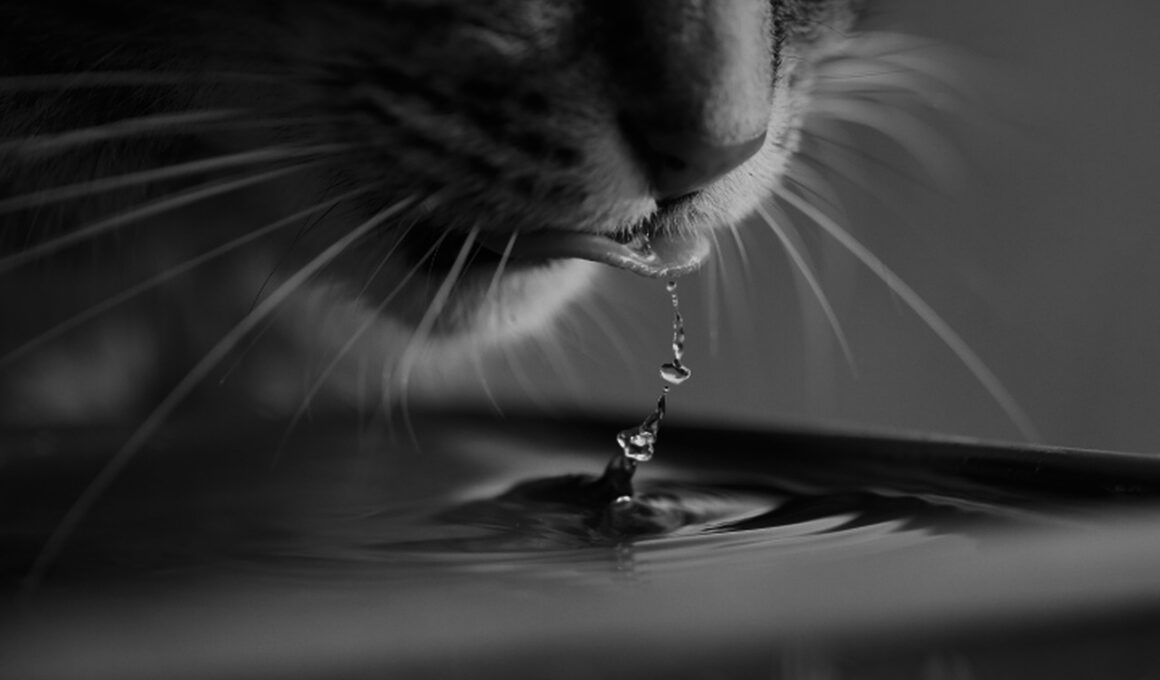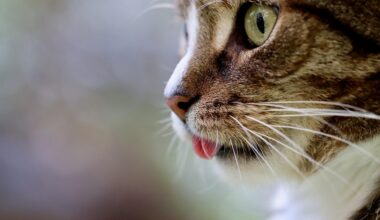The Role of Hydration in Senior Cat Palliative Care
When caring for senior cats undergoing palliative care, hydration becomes a focal point of their well-being. As cats age, they may face various health issues, including kidney problems, which can lead to enhanced risks of dehydration. Proper hydration is essential as it helps to maintain their overall health and alleviates discomfort. Encouraging fluid intake can be achieved through several methods. Offering fresh water in easily accessible bowls might encourage them to drink more. Some cats prefer running water, so pet water fountains can be an excellent alternative. Additionally, incorporating wet food into their diet can significantly contribute to their fluid intake. Some senior cats may be reluctant to drink water, so finding creative ways to encourage hydration can enhance their quality of life. Some owners opt for flavored water or broth to entice their cats. Regularly monitoring your senior cat for signs of dehydration, such as dry gums or lethargy, is crucial. Always consult with your veterinarian about hydration strategies tailored to your cat’s specific needs and health conditions.
Signs of Dehydration in Senior Cats
Recognizing the signs of dehydration in senior cats requires diligent observation and experience. Cats may exhibit certain behavioral changes and physical symptoms when dehydrated. Common indicators include lethargy, dry mouth, and a decrease in appetite. A simple method to test for dehydration is the skin tent test. By gently pinching the skin between a cat’s shoulder blades, if the skin doesn’t return to its normal position quickly, the cat may be dehydrated. Additionally, observing for urine output or changes in the consistency and color of urine can also serve as vital clues. If your cat starts drinking excessively or not at all, this warrants an immediate investigation. It’s essential to ensure they have access to fresh and clean water at all times. Providing a variety of drinking options can often entice senior cats to hydrate. Some cats prefer drinking from a basin, while others favor their bowls or running fountains. Bring any concerns about dehydration to your veterinarian, especially if you spot any worrying symptoms or changes in behavior. Early intervention can make a significant difference.
Techniques for Encouraging Hydration
Encouraging hydration in senior cats can effectively improve their overall health and comfort. There are various techniques that cat owners can implement to ensure their beloved companions are receiving ample fluids. First, entice your cat with wet food, as this provides both nutrients and moisture. Many wet food brands offer high-quality formulas that appeal to picky eaters. Additionally, consider adding water or broth to kibble to create a soupy texture, enhancing the appeal. Treats that are high in moisture content can also play a positive role. Some pet owners find success with special flavored waters, designed to appeal to cats’ palates. Keep in mind that cats are often more willing to drink from a clean and fresh water source. Regularly changing their water or investing in a filter can make a noticeable difference. Older cats might also become desensitized to static water sources, so using running water fountains can intrigue them into drinking more. You should also allow multiple drinking stations around the house to make water easily accessible at all times.
In addition to food and water innovations, some supplementary products can encourage your senior cat to stay hydrated. Electrolyte solutions designed for pets can help maintain hydration levels while remaining palatable. These can be found at most pet stores and veterinary clinics, but be cautious about the ingredients used. Always select those confirmed safe for cats. Moreover, discussing injectable hydration options with your veterinarian might be beneficial, especially for severely affected cats. Subcutaneous fluids at home can be convenient for both the pet and the owner. Moreover, natural remedies such as herbal teas approved for cats can also be beneficial. Monitoring their energy levels and habits as you implement these changes is crucial. Adjusting the supplements or hydration strategies can make a noteworthy difference in their comfort and quality of life. Each cat is unique so what works for one may not work for another. It remains vital to involve your veterinarian in deciding the best course of action. Their guidance can help you navigate the complexities of senior cat care effectively.
The Benefits of Proper Hydration
The benefits of proper hydration in senior cats undergoing palliative care are manifold and essential for maintaining their quality of life. First and foremost, adequate hydration helps support kidney function, which is particularly crucial for aging cats who may already struggle with kidney health. When a cat is well-hydrated, it can help alleviate symptoms of conditions such as urinary tract infections or constipation, which can become common issues in older felines. Sufficient fluid intake can also improve energy levels and overall vitality, enhancing their desire to engage in activities they enjoy. Furthermore, hydration supports proper digestion and nutrient absorption, allowing them to get the most from their food. Regularly monitoring their hydration helps you identify trends or changes that may require veterinary attention. From helping to maintain healthy skin and coat to ensuring regular body temperature regulation, the importance of hydration cannot be overstated. As a caregiver, developing individualized hydration goals tailored to your senior cat’s unique health circumstances can lead to significant improvements in their daily lives.
Consulting with Your Veterinarian
Working closely with your veterinarian is paramount in formulating the best hydration strategies for your senior cat. Veterinarians can offer tailored recommendations based on your cat’s specific health issues and lifestyle. Regular check-ups help ensure any underlying conditions are addressed promptly. Be proactive in discussing your hydration approach and any observations regarding your cat’s drinking habits. Always inquire about what types of moisture-laden food options may benefit your cat and consult on any new products or strategies. Many veterinarians recommend specific brands of wet food or hydration supplements that are known for their efficacy with senior cats. Additionally, veterinary professionals can assist in crafting joint plans to address common hydration-related issues. If needed, they may explore hydration therapy through electrolytes or subcutaneous fluid therapies. Understanding the stages of your cat’s palliative care also helps you anticipate their changing needs over time. Empower yourself with knowledge from your vet and use it to provide the best support possible during this sensitive period of their life.
Ultimately, maintaining proper hydration plays a crucial role in enhancing the comfort and quality of life for senior cats receiving palliative care. Understanding their unique needs can help mitigate the impact of various age-related health challenges. Recognizing the signs of dehydration and employing effective techniques can assist in encouraging appropriate fluid intake. Collaborate with your veterinarian to create a comprehensive care plan that addresses hydration and general wellness. Remember that cats may experience preferences towards particular water sources or food types. Staying observant and adaptable allows you to find what works best. Keeping your cat comfortable and happy during this stage rests heavily on hydration, as both a proactive measure and a response to potential issues. Your dedication to ensuring their well-being goes a long way in providing comfort. Therefore, focus on the little changes that can lead to positive, lasting effects on their health. Hydration isn’t merely about drinking water; it encompasses all strategies to improve their overall quality of life while navigating the challenges of aging. Your commitment will surely help them thrive.


